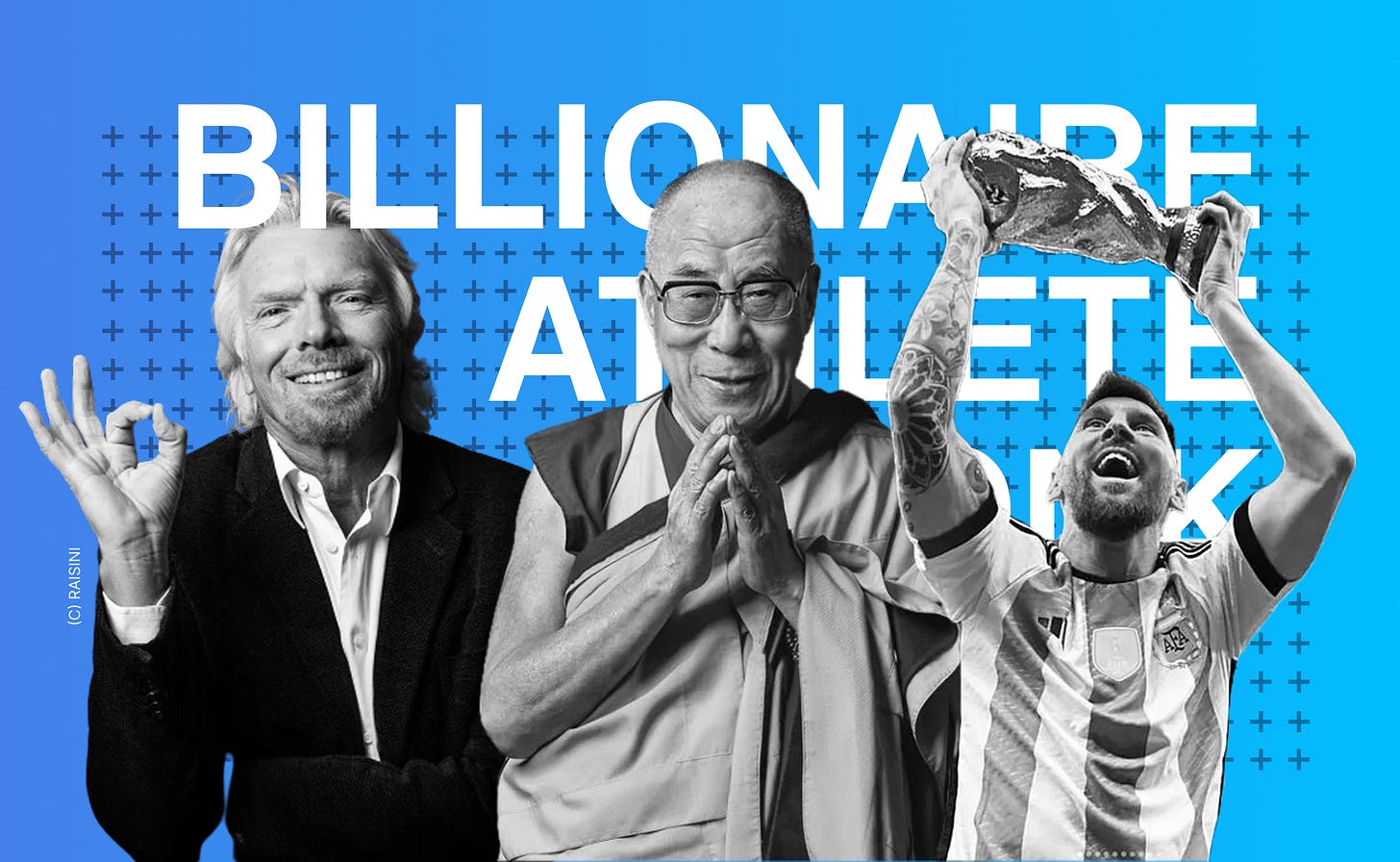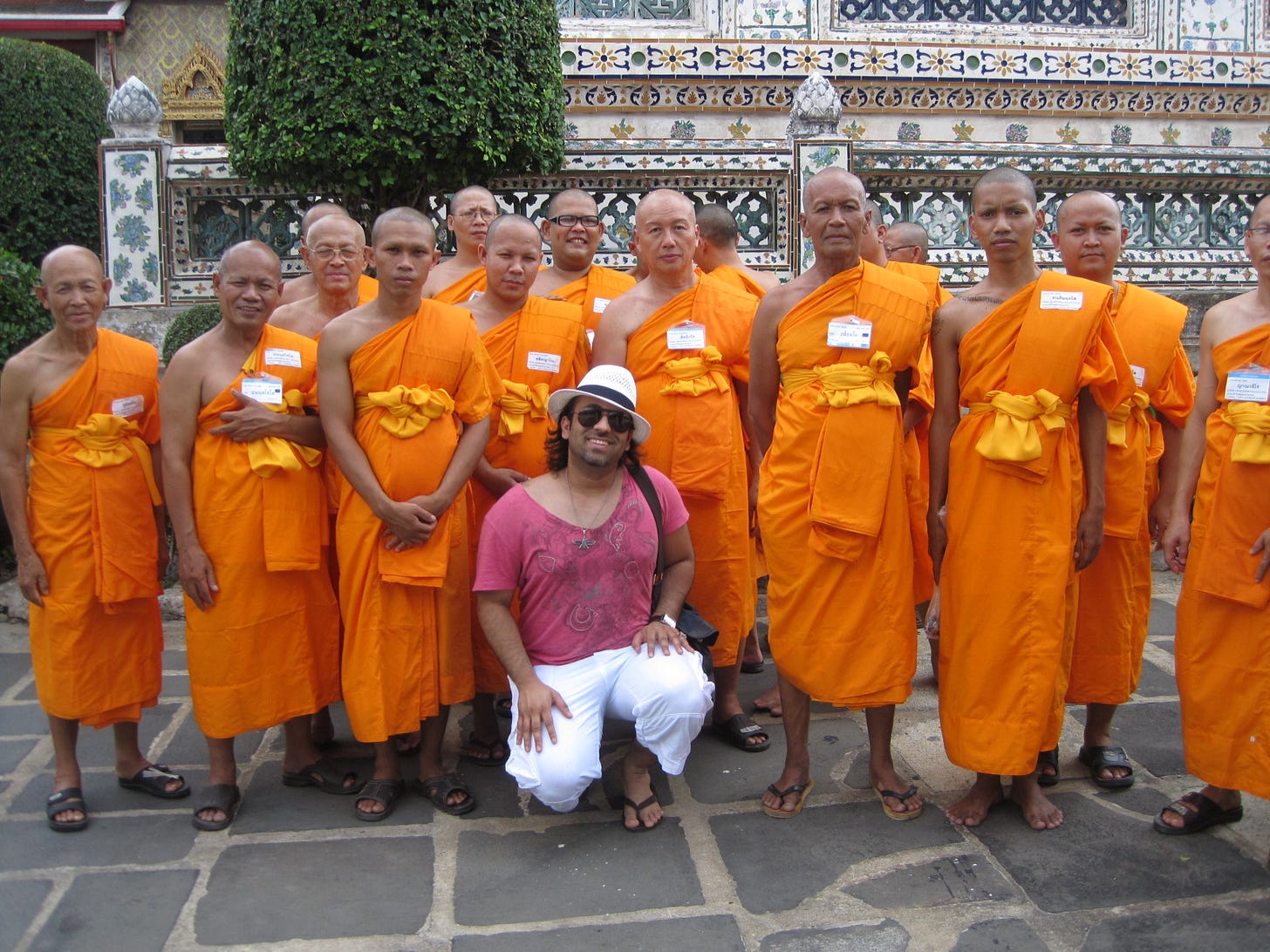The Billionaire, The Monk, & The Athlete: How They Approach Life Differently
What They Teach Us About Happiness, Success, and Longevity
Welcome to this week’s issue of RAISINI.
Every week, i write about building a life on your own terms - through music, entrepreneurship, investing, health and brand-building. This isn’t theory. It’s what I’ve lived. Let’s keep going.
If you want access to private chats, live events, workshops, and more, consider becoming a founding member.
I’ve had the rare privilege of meeting some of the most successful and disciplined people in the world - billionaires, world-class athletes, and even monks. My journey in the music and entertainment industry took me into rooms where the air felt different.
Every summer, I spend time in the Mediterranean, sailing with friends and meeting people from all walks of life, including those who have built extraordinary success. Being in these circles, I’ve observed how their lives are shaped by structure and discipline. Their wealth isn’t just about money - it’s a reflection of the habits, routines, and decisions that got them there.
I have also met elite athletes, footballers, Olympians, Tennis stars who sacrifice more than most can imagine to maintain peak performance. And traveling across Asia, in Thailand, I had the honor of a brief conversation with the Dalai Lama himself, who, after learning about my disciplined nature, jokingly invited me to become a monk.
At first glance, billionaires, monks, and athletes seem to have nothing in common. One chases financial success, another seeks enlightenment, and the third dedicates their life to physical excellence. Yet, beneath the surface, they share something fundamental: discipline and intentional living. They don’t let life happen to them -they design it with purpose.
Recently, while getting a haircut in London, I had small talk with the barber, who is from Tennessee, USA. He had left his small town and moved to a city where he knew no one. I asked why, and he told me he wanted a challenge, something bigger than the small world he came from. As we talked about education, he said he dropped out of college because he couldn’t sit in lectures and listen to material that was freely available online and didn’t see the worth of a degree. I explained that going to college isn’t always about the degree - it’s about discipline. Employers don’t just care about what you studied; they care that you showed up every day for four years and followed through. It’s the same reason soldiers endure years of training. It’s about structure.
Athletes, monks, and billionaires understand this better than anyone. Athletes like Messi, Ronaldo, and Djokovic are still competing at nearly 40 because of their discipline. Billionaires don’t waste time - they operate on long-term strategies. Monks live with intention, removing distractions to focus on what truly matters.
And yet, most people live on autopilot, waking up every day without a clear direction. I want to break down the key habits, mindsets, and philosophies that billionaires, monks, and athletes use to create extraordinary lives - so you can apply them to yours.
The Power of Discipline: Why Structure Creates Freedom
Most people think of discipline as restrictive, like it takes away freedom. They see routines as boring, rules as suffocating, and structure as something that kills spontaneity. But the truth is, discipline doesn’t take away freedom - it creates it. If you study the lives of billionaires, monks, and athletes, the one thing they all have in common is strict discipline. Their success isn’t based on luck, motivation, or natural talent. It’s their commitment to structure that allows them to reach extraordinary heights.
Billionaires: Structure to Maximize Productivity
Warren Buffett, Jeff Bezos, and Richard Branson didn’t build their empires by winging it. They mastered time and decision-making by sticking to strict routines. Buffett, for example, follows a highly predictable schedule: he reads for five to six hours a day, eats the same simple breakfast, and avoids unnecessary meetings. He believes in eliminating distractions so he can focus only on high-value decisions.
Bezos famously prioritizes getting eight hours of sleep, scheduling important decisions in the morning, and keeping his afternoons open for creative thinking. Branson, despite managing multiple companies, segments his day into five-minute blocks. Every minute is accounted for - because he knows wasted time is wasted opportunity. I had the privilege of having Richard as a mentor and learn from him.
The secret to their success isn’t in working 20-hour days but in building systems that eliminate distractions and automate low-value decisions. They don’t waste time deciding what to wear or eat every day. Steve Jobs wore the same black turtleneck, jeans, and sneakers daily for a reason - fewer trivial decisions meant more energy for the big ones.
Billionaires use discipline to reduce decision fatigue, so their minds are fresh for the choices that truly matter. They understand that freedom doesn’t come from doing whatever you want, whenever you want. It comes from being in control of your time and energy.
Monks: Structure for Inner Peace
While billionaires use discipline for productivity, monks use it for spiritual clarity. Their days follow a strict rhythm of meditation, study, and service. They wake up at dawn, eat simple meals, and practice mindfulness throughout the day. The predictability of their routine isn’t boring - it’s liberating.
In a world filled with distractions, monks train themselves to stay present. They eliminate unnecessary noise, reduce external stimulation, and focus entirely on their purpose. They don’t waste mental energy on what to eat, what to wear, or what to do next. Their structure removes uncertainty and allows them to focus on deeper self-awareness.
For monks, discipline is the path to true freedom - the freedom from anxiety, overthinking, and attachment. Their strict daily structure ensures that they aren’t controlled by fleeting desires but by their purpose.
Athletes: Structure to Maintain Peak Performance
Athletes like Lionel Messi, Cristiano Ronaldo, and Rafael Nadal have redefined what it means to be disciplined. Their success isn’t just about talent - it’s about the routines they refuse to break, no matter the circumstances.
Messi, despite being one of the greatest footballers of all time, never relied on talent alone. Even after winning record 8 Ballon d'Ors, he continued waking up early for training, sticking to the same drills, and pushing himself harder than anyone else. He understood that discipline, not motivation, separates the great from the greatest.
Cristiano Ronaldo, known for his relentless work ethic, follows an almost robotic routine. He sleeps and wakes up at the same time every day, eats the same meticulously planned meals, and trains multiple times - without fail. His workouts aren’t based on how he feels but on a strict plan designed for peak performance. Whether he’s on vacation or in the middle of a season, he sticks to his system. His routine isn’t about motivation - it’s about consistency.
Then there’s Rafael Nadal, a player who embodies mental and physical resilience. He trained at the same time, in the same way, throughout his illustrious career - never skipping a session, not even on holidays. This discipline not only made him one of the most dominant tennis players in history but also forged an unshakable mindset. Even under the highest pressure - like playing through injuries or battling back from two sets down - his brain and body knew exactly what to do because they had been conditioned through years of strict, unwavering practice.
These athletes don’t leave their success to chance. They remove distractions, eliminate guesswork, and follow a structure that keeps them sharp, focused, and always ahead of the competition.
Athletes use discipline to remove decision-making from the equation. They don’t ask themselves, "Should I train today?" They already know the answer. Their routine ensures that no matter how they feel, their actions remain the same.
The Paradox of Discipline: Structure Creates Freedom
Most people believe freedom means doing whatever you want. But real freedom is having full control over your life.
Without discipline, people become slaves to their emotions, bad habits, and distractions. They waste time, procrastinate, and struggle with inconsistency. Their lack of structure creates chaos, stress, and failure.
High performers understand the paradox: Discipline isn’t a restriction. It’s the key to achieving anything you want in life.
The lesson? If you want to be successful, stop waiting for motivation. Build a routine that eliminates distractions and automates progress. Whether it’s waking up early, working out, reading, or meditating - commit to it daily. Over time, discipline will create the freedom to live life on your own terms.
Mastering the Mind: Mental Toughness & Emotional Control
Keep reading with a 7-day free trial
Subscribe to RΛISINI to keep reading this post and get 7 days of free access to the full post archives.




